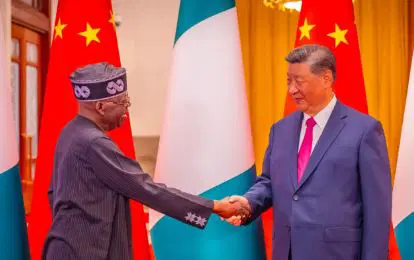President Bola Tinubu’s recent official visit to China has yielded significant outcomes, promising to impact various sectors of Nigeria’s development. The visit, characterized by high-level engagements and substantial agreements, marks a notable advancement in Nigeria-China relations and presents a range of opportunities for infrastructure, technology, and economic growth.
ENTOURAGE AND FOCUS
The President’s entourage included key officials from various sectors, reflecting the multifaceted goals of the visit. Notable figures included the Finance Minister, Minister of Trade and Investment, Minister of Solid Minerals, Minister of Power, and several state governors. This diverse representation underscored the broad scope of the visit, aiming to address critical areas such as infrastructure, agriculture, and energy.
INFRASTRUCTURE DEVELOPMENT
A highlight of the visit was President Tinubu’s engagement with the China Railway Construction Corporation (CRCC). During his visit to CRCC’s headquarters, he emphasized the completion of the Lagos-Kano Railway project, including the Ibadan-Abuja-Kaduna-Kano segments. The involvement of the China Development Bank in funding the Kaduna-Kano section and renewed cooperation on the Belt and Road Initiative signals a continued and deepened partnership.
TECHNOLOGY AND DIGITAL LITERACY
At Huawei Technologies’ Beijing Research Centre, President Tinubu witnessed the launch of the DigiTruck, a mobile ICT classroom designed to boost digital literacy in Nigeria’s underserved communities. Huawei’s commitment to operating the DigiTruck in 10 states annually and training 3,000 students each year, along with the proposed establishment of technology data storage centers in Lagos and Kaduna, promises to enhance Nigeria’s technological infrastructure and create job opportunities for the youth.
BILATERAL MEETINGS AND AGREEMENTS
A significant achievement of the visit was the high-powered bilateral meeting between President Tinubu and Chinese President Xi Jinping. The elevation of Nigeria-China relations to a comprehensive strategic partnership reflects a deepening of ties between the two nations. Several Memoranda of Understanding (MoUs) were signed, covering various fields:
- Belt and Road Initiative: This MoU will promote the implementation of infrastructure projects, including railways and roads/bridges.
- Nuclear Energy: This agreement aims to enhance Nigeria’s capability to utilize nuclear technology for electricity generation and medical applications.
- Economic Development: The MoUs also cover broader economic cooperation, including peanut exports to China and media collaboration.
CONCLUSION
President Tinubu’s visit to China represents a milestone in Nigeria’s development journey, with significant agreements set to enhance infrastructure, technology, and economic growth. The strengthened bilateral relations and collaborative projects underscore the potential for transformative progress in Nigeria, driven by strategic partnerships and targeted investments.

